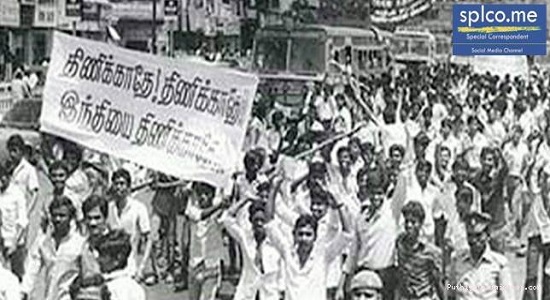On Friday, Dravida Munnetra Kazhagam (DMK)’s working president and leader of the opposition in Tamil Nadu Assembly, MK Stalin attacked the Centre for allegedly imposing Hindi and Sanskrit on the people of India.

He went on to say that the Center’s policies are forcing the DMK to warm for a 1965-type stir in order to protect the Tamil language.
In the 1960s, the DMK was undergoing a radical transformation in terms of its ideology. It focussed towards Tamil consciousness, and pride in Tamil language and culture.
The opposition to Hindi, therefore, would go on to become an intrinsic part of the party’s language politics, and the 1965 agitation would be its strongest manifestation.
When Stalin indicated to the possibility of a 1965-type stir, he was referring to one of the most powerful movements in support of Tamil linguistic pride in the state’s history. “Notwithstanding the expiration of the period of fifteen years from the commencement of the Constitution, the English language may, as from the appointed day, continue to be used in addition to Hindi,” said section 3 of the Official Languages Act, 1963.
Disappointed with the use of the word ‘may’ in the Act instead of ‘shall’ to indicate the usage of English, the DMK protested in the Parliament, giving voice to their fears that the Act would, in the course of time, marginalise non-Hindi speakers of the country. The fears of the DMK would soon manifest themselves in the form of the large-scale riots that took place from January 1965 against the State’s alleged imposition of Hindi.
Scheduled to come into force from January 26, 1965, the Official Languages Act was an attempt by the central government to do away with the compromise formula reached by the Constituent Assembly in 1949 when the issue of national language had stemmed. The Assembly had, at that point in time, decided that the best way to assuage the linguistic sensibilities of all parties was to not announce a national language at all and, instead, make Hindi the official language, while English would be the associate language.
In the course of the next five years, the government decided to promote Hindi as the sole language, while English would be gradually phased out. By the end of 1950s, however, as the Center stepped up its efforts to promote Hindi, the DMK protested against what they saw as an unfair linguistic imposition.
On January 28, 1956, C M Annadurai along with Periyar and Rajaji signed a resolution, asking for continuation of English as the associate language. In 1963 when the Official Languages Act was passed, it was decided that English may be continued to be used in addition to Hindi for official purposes. However, the DMK was unsatisfied by the wording of the Act.
As the date of the enforcement of the Act approached, protests against Hindi spread far and wide in Tamil Nadu, with student organisations leading the agitation from the front. The Tamil Nadu Students Anti Hindi Agitation Council was formed as an umbrella for all protesting student organisations. They organised conferences across the state protesting against the alleged Hindi imposition.
On January 16, DMK chief C.N. Annadurai announced that January 26 would be observed as a day of mourning by the party. On January 25, he along with 3000 DMK workers were taken into preventive custody to avoid violence the following day.
On January 26, close to 50,000 students in Madras marched with a petition to the government secretariat at Fort St, George. Riots had spread to all parts of the state. Telegraph poles and railways were destroyed. Hundreds of people were killed, several others arrested and the loss of property ran into millions. The agitation spilled into the month of February.
On February 11, 1965, alarmed by the scale of violence that had taken place against Hindi, the then prime minister Lal Bahadur Shastri declared on national radio that English would be used for official communications and that the All India Civil Service examination would continue to be held in English. Shastri’s assurance brought the agitation to an end.
In 1967, under the tenure of prime minister Indira Gandhi, the 1963 Act was amended to guarantee that both Hindi and English would be used indefinitely in official transactions.














